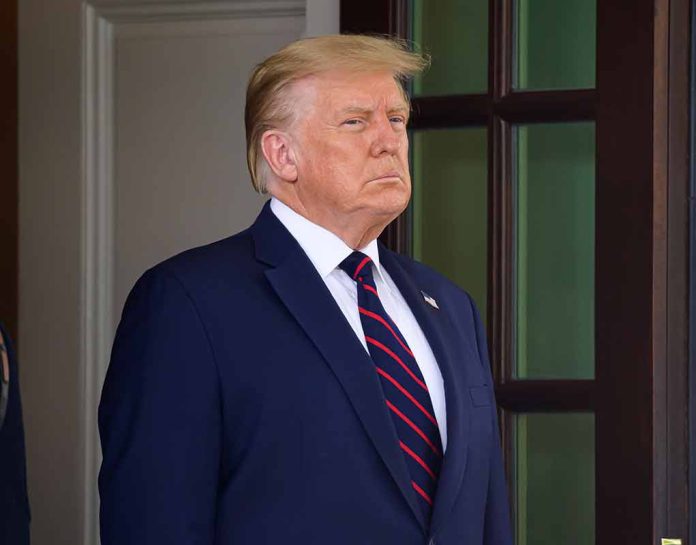
President Donald J. Trump unveils a comprehensive plan to restore free speech in America, challenging what he calls a “left-wing censorship regime.”
At a Glance
- Trump announces policy initiative to dismantle censorship and restore free speech
- Plans include executive orders, legal actions, and revisions to Section 230
- Proposes a digital Bill of Rights and restrictions on former intelligence officials
- Frames the fight for free speech as crucial for America’s survival
Trump’s Free Speech Policy Initiative
Former President Donald J. Trump has announced a new policy initiative aimed at dismantling what he perceives as a system of censorship and restoring free speech in the United States. The proposal outlines a series of actions Trump plans to take if re-elected, targeting what he describes as a coordinated effort by Deep State bureaucrats, Silicon Valley companies, left-wing activists, and corporate media to silence Americans.
This alone puts DJT in company with the greatest U.S. presidents since Lincoln. The globalist project has laid siege to democracy and freedom across the globe. The USA is the final redoubt. President Trump just launched freedom’s counterattack. https://t.co/2brXEjTByg
— Robert F. Kennedy Jr (@RobertKennedyJr) November 9, 2024
Trump’s initiative includes signing an executive order to prevent federal agencies from colluding to censor lawful speech, banning federal funds from being used to label domestic speech as misinformation, and ordering the Department of Justice to investigate and prosecute parties involved in online censorship. These measures aim to address what Trump sees as a threat to the fundamental right of free speech in America.
Revising Section 230 and Breaking Up the Censorship Industry
A key component of Trump’s plan involves revising Section 230 of the Communications Decency Act to ensure digital platforms meet standards of neutrality and transparency. This revision would potentially alter the legal protections currently afforded to social media companies and other online platforms regarding user-generated content.
“If we don’t have FREE SPEECH, then we just don’t have a FREE COUNTRY.” – President Donald J. Trump
Trump also proposes breaking up what he terms the “censorship industry” by stopping federal funding for non-profits and academic programs involved in censorship activities. Additionally, he plans to enact laws with penalties for federal bureaucrats who attempt to bypass constitutional rights, further emphasizing his commitment to protecting free speech.
Digital Bill of Rights and Restrictions on Former Intelligence Officials
The initiative includes a proposal for a digital Bill of Rights, which would encompass digital due process and user rights regarding content moderation. This measure aims to provide clearer guidelines and protections for online speech and user data. Trump also proposes implementing a 7-year cooling-off period for former intelligence officials before they can join companies with access to U.S. user data, addressing concerns about potential conflicts of interest and the protection of personal information.
“That’s why today, I am announcing my plan to shatter the left-wing censorship regime, and to reclaim the right to Free Speech for all Americans.” – President Donald J. Trump
Trump frames the fight for free speech as crucial not only for America’s survival but also for Western Civilization. He pledges to dismantle the current system of censorship if re-elected, positioning this initiative as a cornerstone of his potential future administration’s policy agenda.
Implications and Reactions
The announcement of this free speech policy initiative has sparked discussions about the balance between protecting free speech and addressing concerns about misinformation and harmful content online. Supporters view the proposal as a necessary step to safeguard First Amendment rights in the digital age, while critics may raise concerns about potential unintended consequences and the practicality of implementing such wide-ranging changes to current laws and practices.
“The fight for Free Speech is a matter of victory or death for America—and for the survival of Western Civilization itself.” – President Donald J. Trump
As Trump’s second term approaches, this policy initiative is likely to become a significant talking point, potentially shaping the debate around free speech, technology regulation, and the role of government in the digital sphere. The implementation and impact of these proposed measures would depend on various factors, including congressional support and potential legal challenges.







